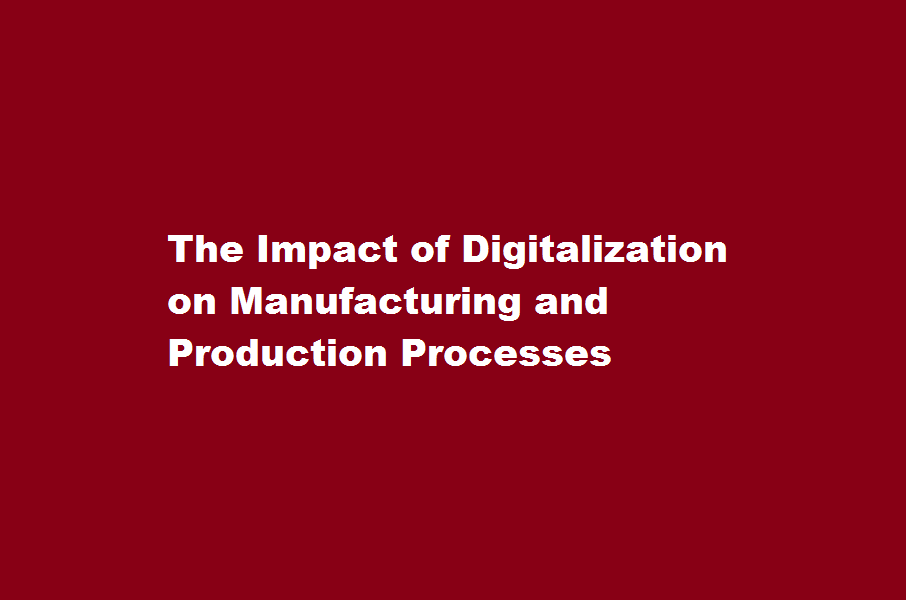The Impact of Digitalization on Manufacturing and Production Processes
3 min read
Introduction
Digitalization has brought about significant transformations in the manufacturing and production processes. From automation and robotics to data analytics and supply chain optimization, digital technologies have revolutionized how products are manufactured, assembled, and delivered. This article explores the key ways in which digitalization affects the manufacturing and production processes, driving improvements in efficiency, productivity, and innovation.
Automation and Robotics
Digitalization has enabled the widespread adoption of automation and robotics in manufacturing. Robotic systems can perform repetitive tasks with high precision and speed, reducing human errors and enhancing production efficiency. Automated assembly lines, robotic arms, and autonomous vehicles have streamlined manufacturing processes, leading to increased productivity and cost savings.
Data Analytics and Predictive Maintenance
Digitalization has enabled the collection and analysis of vast amounts of data in real-time. Manufacturers leverage data analytics to optimize production processes, identify inefficiencies, and make data-driven decisions. Predictive maintenance systems use sensor data and machine learning algorithms to detect potential equipment failures before they occur, reducing downtime and improving overall equipment effectiveness (OEE).
Internet of Things (IoT) and Connectivity
The Internet of Things (IoT) has transformed manufacturing by connecting machines, devices, and sensors within the production environment. IoT-enabled devices collect and exchange data, enabling real-time monitoring and control of manufacturing processes. This connectivity allows for remote monitoring, predictive maintenance, and improved resource allocation, leading to more efficient and responsive production systems.
Digital Twin and Simulation
Digital twins are virtual replicas of physical assets, products, or processes. Digitalization has facilitated the creation of digital twins, allowing manufacturers to simulate and optimize production processes before physical implementation. Digital twins enable predictive modeling, scenario testing, and performance optimization, reducing development time and costs while enhancing product quality.
Supply Chain Optimization
Digitalization has revolutionized supply chain management in the manufacturing industry. Advanced analytics, real-time tracking, and blockchain technology enable improved visibility, traceability, and collaboration across the supply chain. Manufacturers can optimize inventory management, minimize lead times, and respond rapidly to changing customer demands, resulting in enhanced operational efficiency and customer satisfaction.
Additive Manufacturing and 3D Printing
Digitalization has facilitated the adoption of additive manufacturing, commonly known as 3D printing, in the manufacturing industry. Additive manufacturing allows for the production of complex parts with reduced material waste and shorter lead times. It enables customization, rapid prototyping, and on-demand manufacturing, opening up new possibilities for design innovation and supply chain efficiency.
Frequently Asked Questions
How does digitalization improve product quality in manufacturing?
Digitalization improves product quality in manufacturing through real-time monitoring, data analytics, and quality control systems. By collecting and analyzing data at each stage of the production process, manufacturers can identify defects, deviations, and quality issues in real-time. This enables proactive measures to be taken, reducing defects, enhancing product quality, and ensuring customer satisfaction.
What are the benefits of digitalization in lean manufacturing?
Digitalization enhances lean manufacturing by improving visibility, data-driven decision making, and process optimization. By digitizing processes, manufacturers can identify waste, bottlenecks, and inefficiencies, allowing for targeted improvements. Real-time data and analytics help in monitoring and optimizing key performance indicators, reducing waste, and increasing overall operational efficiency.
How does digitalization promote innovation in manufacturing?
Digitalization promotes innovation in manufacturing by facilitating rapid prototyping, design optimization, and collaboration. Technologies like 3D printing, digital twins, and simulation tools allow for faster design iterations, reducing time-to-market and enabling product customization. Digital platforms also facilitate collaboration between designers, engineers, and production teams, fostering innovation and creativity.
Conclusion
Digitalization has brought about a revolution in the manufacturing and production processes. From automation and robotics to data analytics, IoT connectivity, and additive manufacturing, digital technologies have transformed traditional manufacturing methods. By embracing digitalization, manufacturers can enhance efficiency, productivity, and innovation, leading to cost savings, improved product quality, and enhanced customer satisfaction. As technology continues to advance, the manufacturing industry must adapt and embrace digital transformation to stay competitive in the dynamic and interconnected global market.
Read Also : The Transformation of Information Consumption






